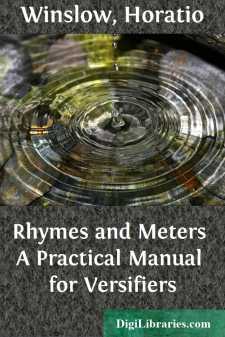Categories
- Antiques & Collectibles 13
- Architecture 36
- Art 48
- Bibles 22
- Biography & Autobiography 813
- Body, Mind & Spirit 142
- Business & Economics 28
- Children's Books 17
- Children's Fiction 14
- Computers 4
- Cooking 94
- Crafts & Hobbies 4
- Drama 346
- Education 46
- Family & Relationships 57
- Fiction 11829
- Games 19
- Gardening 17
- Health & Fitness 34
- History 1377
- House & Home 1
- Humor 147
- Juvenile Fiction 1873
- Juvenile Nonfiction 202
- Language Arts & Disciplines 88
- Law 16
- Literary Collections 686
- Literary Criticism 179
- Mathematics 13
- Medical 41
- Music 40
- Nature 179
- Non-Classifiable 1768
- Performing Arts 7
- Periodicals 1453
- Philosophy 64
- Photography 2
- Poetry 896
- Political Science 203
- Psychology 42
- Reference 154
- Religion 513
- Science 126
- Self-Help 84
- Social Science 81
- Sports & Recreation 34
- Study Aids 3
- Technology & Engineering 59
- Transportation 23
- Travel 463
- True Crime 29
Rhymes and Meters A Practical Manual for Versifiers
by: Horatio Winslow
Categories:
Description:
Excerpt
VERSE MAKING IN GENERAL
It is scarcely necessary to write a defense of verse making. As a literary exercise it has been recommended and practiced by every well-known English writer and as a literary asset it has been of practical value at one time or another to most of the authors of to-day. Indirectly it helps one’s prose and is an essential to the understanding of the greatest literature.
The fact that courses in “Poetics” have been established at all the large universities shows the interest which verse making has aroused in America. In England the ability to write metrical verse has long been considered one of the component parts of the education of a university man.
Looked at from the purely practical side, even though not a single line be sold, verse making has its value. It strengthens the vocabulary; teaches niceness in the choice of words; invigorates the imagination and disciplines the mind far more than a dozen times the amount of prose.
But, though careful verse is much more difficult to write than careful prose, slipshod verse is not worth the ink that shapes it. In taking up verse writing the student must solemnly resolve on one thing: to consider no composition complete until it proves up—until the rhymes and meter are perfect. This “perfection” is not as unattainable as it sounds, for the laws of rhyme and meter are as fixed as the laws of the Medes and the Persians. Any one may not be able to write artistic verse, but any one can write true verse, and the only way to make a course in verse writing count is to live up to all the rules; to banish all ideas of “poetic license”; to write and rewrite till the composition is as near perfect as lies in one, and finally to lay aside and rewrite again.
After the line scans and the rhymes are proved should come the effort to put the thought clearly. It is often hard to say what one means in prose. It is harder in verse. In fact, one of the greatest difficulties any verse maker can overcome is the tendency to be obscure in his meaning.
With the surmounting of this obstacle comes simplicity of diction; to present the thought without superfluous words; to avoid the threadbare phrases and to put the idea in a new way and yet in plain speech. How far the verse maker will go in clearness and simplicity depends largely on his natural good taste and discrimination. The better he is able to appreciate the work of others the better his own will become, and this appreciation, though it cannot be created, can be cultivated as well as good manners. To-day more than ever before good reading is one of the prime essentials to good writing.
Stevenson has recommended imitation as a road to originality and few have disagreed with him on this point. It is undoubtedly easier to write a sonnet if one is familiar with Wordsworth or to write a ballade if one has read Dobson. At the same time to be of value the imitation must be done broadly and systematically. The artist does not learn to draw by copying Gibson heads nor the verse maker to write by diluting Kipling....


